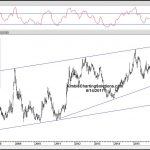There is a vociferous debate going on right now about whether and to what extent small caps can continue to outperform going forward.
Needless to say, this is tied up with the trade war discussion. Small-cap outperformance in 2018 has generally been attributed to the assumption that less international revenue exposure (relative to large caps) inoculates them against further escalations on the trade front.

As you can see from that visual, U.S. small caps’ outperformance versus global equities has come off a bit from the highs recently, and the idea that they’re immune to the trade war was called into question last month by Morgan Stanley and also by Barclays.
“Recently, US small caps have been the safe haven of choice over the S&P 500 as investors view them as less vulnerable to rising trade tensions [and] while this makes sense intuitively, we are skeptical that US-centric small cap companies would be immune to a major escalation in trade tensions, which would ultimately be a significant drag on the US economy, too”, Morgan Stanley wrote on July 9, in the same note that found the bank’s Michael Wilson delivering the tech downgrade that won him plaudits in the media last week, amid the FANG+ correction.
“What really matters for estimating the impact of tariffs are the actual imports and exports and margins”, Barclays said, in a lengthy piece throwing cold water on the idea that small caps can continue to outperform.

(Barclays)
For those interested in this debate, BofAML’s Jill Carey Hall and Savita Subramanian have re-launched their small-cap strategy research and they’re “cautious” for a long list of reasons, one of which recalls some of my random musings from a July 8 post, in which I said this (and do note that I always try to play down these “predictions” because they’re not really “predictions”, they’re just me calling it like I see it at any given time):


















Leave A Comment